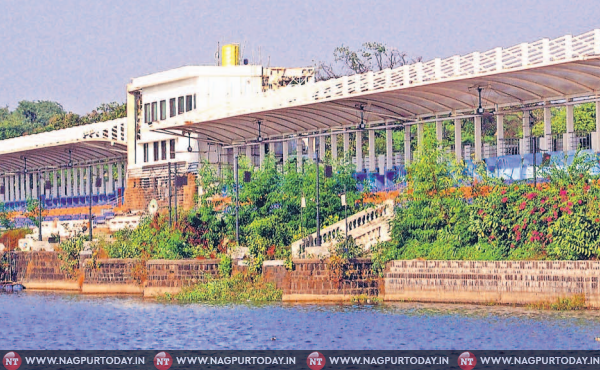
Nagpur: The once-celebrated Futala Lake Fountain Project, envisioned as a symbol of urban grandeur, now lies in a state of disrepair, epitomizing wasteful expenditure. What was launched with pomp and promise has become a glaring White Elephant, a testament to poor planning and disregard for environmental advice.
A visit to the site reveals a grim picture. The sprawling viewing gallery, touted as a tourist attraction, is now rusting, with sections visibly corroded. Sculptures once intended to enhance the aesthetic appeal of the area are either broken or missing. The much-touted hanging garden is a shadow of its former self, with plants dried up and neglected. Dust and debris blanket the ticket counters and even the decommissioned Indian Air Force helicopter displayed on the premises.
Adding to the disarray, the eating joints that were cleared from the roadside have re-emerged, resuming their businesses, albeit amidst the chaos. The lake itself presents a forlorn image, its beauty overshadowed by the towering gallery that blocks the panoramic view — a stark contrast to global best practices where waterfront views remain unobstructed.
A project marred by controversy
From its inception, the Futala Lake Fountain Project faced strong opposition. Environmental experts, zoologists, and heritage conservationists warned against its implementation, citing potential ecological and structural damage. Yet, these concerns were ignored, and the project was greenlit, backed by high-profile endorsements and significant funding.
The fountain, once a centrepiece of evening entertainment, has stopped functioning. The grand viewing gallery, meant to host visitors and offer stunning vistas, remains largely unused. Its exterior is adorned with dust-laden decorations, while the interiors appear untouched for months. Visitors are greeted by garbage, liquor bottles, and discarded wrappers near the ticket counters — a stark reminder of neglect.
The heritage value of Futala Lake has been severely compromised. Clause 11(E) of the Heritage Regulations clearly states that any development on a Grade-I heritage site must preserve its grandeur and not obstruct its view. Instead, the project has done the opposite, overshadowing the natural charm of the lake with concrete and rusting structures.
Before this controversial project, the lake area boasted vibrant, well-run eateries under the Nagpur Improvement Trust. These establishments provided livelihoods without obstructing the lake’s view. Their demolition to make way for the gallery left many unemployed and disrupted the area’s ecosystem.
Experts emphasize that the lake urgently needs desilting, a structural audit, and ecological rejuvenation—not extravagant, ill-conceived projects. They warn that such developments, combined with the fountain’s operation, could permanently damage the lake’s health.
The Futala Lake Fountain Project stands as a cautionary tale. It reflects a misguided approach to urban development, where aesthetics and short-term gains were prioritized over sustainability and public utility. Residents and experts alike demand accountability and a reevaluation of priorities to restore the lake to its former glory and ensure that future projects align with ecological and heritage norms.
Nagpur deserves better — a vision that balances development with preservation, not one that leaves behind rust, dust, and broken promises.
















